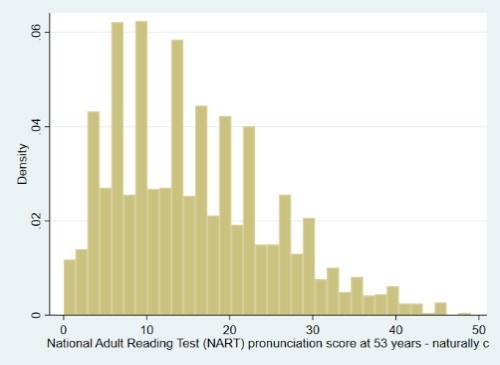The MRC National Survey of Health of Development (NSHD) assessed their cohort members (CMs) during the study’s age 53 sweep using the National Adult Reading Test (NART).
Details on this measure and the data collected from the CMs are outlined in the table below.
| Domain | Verbal (reading) |
| Measures: | Knowledge acquisition |
| Correlates highly with IQ | |
| Used to estimate premorbid cognitive ability | |
| Reading decoding | |
| CHC: | Gc (Crystallized intelligence) |
| Grw (Reading/writing) | |
| Administration method: | Research nurse; face to face; read aloud |
| Procedure: | Participants were asked to read aloud a list of 50 words that increased in difficulty. The words were 'irregular'; i.e. they do not conform to common rules of pronunciation. This was to minimise the likelihood that successful pronunciation was due to intelligent guesswork rather than previous knowledge of the word in question. For example, 'naïve' might be pronounced as 'nave' without any prior knowledge of the word. The interviewer recorded the number of errors (mispronounced words). This score was then inverted by subtracting the number of errors from 50, in order to be consistent with the direction of scoring of other measures administered at this age. |
| Link to questionnaire: | https://skylark.ucl.ac.uk/NSHD/lib/exe/fetch.php?media=questionnaires:1999-capi.pdf (opens in new tab) |
| Scoring: | Number of errors inverted (0 - 50) |
| Item-level variable(s): | Not currently available |
| Total score/derived variable(s): | nart99 |
| Descriptives: | Raw score |
| N = 2,825 | |
| Range = 0 - 49 | |
| Mean = 15.69 | |
| SD = 9.54 | |
(click image to enlarge) |
|
| Age of participants (months): | Mean = 641.47, SD = 2.09, Range = 636 - 650 |
| Other sweep and/or cohort: | None |
| Source: | Nelson, H. E., & Willison, J. (1991). National Adult Reading Test (NART). Windsor: Nfer-Nelson. |
| Technical resources: | None |
| Reference examples: | Richards, M., & Sacker, A. (2003). Lifetime antecedents of cognitive reserve. Journal of Clinical and Experimental Neuropsychology, 25(5), 614-624. |
| Davies, G., Tenesa, A., Payton, A., Yang, J., Harris, S. E., Liewald, D., ... & McGhee, K. (2011). Genome-wide association studies establish that human intelligence is highly heritable and polygenic. Molecular Psychiatry, 16(10), 996. |
Go to:
- Overview of all cognitive measures in NSHD
- Overview of adulthood cognitive measures across all studies
This page is part of CLOSER’s ‘A guide to the cognitive measures in five British birth cohort studies’.
